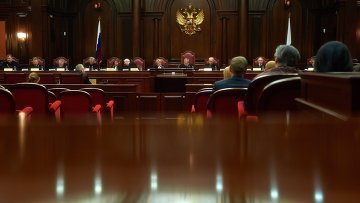MOSCOW, January 24 (RAPSI) – Russian Constitutional Court on March 6 will review the applications filed by Human Rights Commissioner Vladimir Lukin and various citizens and NGOs contesting the controversial NGO law.
Earlier this week, representatives of one of claimants, the Kostroma Center for Civic Initiatives Support, filed an official complaint with the Constitutional Cout’s chairman, Valery Zorkin. In the complaint they protested the procrastination of their application’s review. On January 22, attorneys with the Agora association, representing the NGO, filed an application with the ECHR.
The originalcomplaint with the Constitutional Court was lodged by the Kostroma Center for Civic Initiatives Support which was fined last May 300,000 rubles (app, $9,000) for breaching the law. Alexander Zamaryanov, executive director of the NGO, was personally fined 100,000 rubles (app. $3,000) in the case. The prosecutors claimed that the NGO received funds from abroad and was engaged in political activities, but failed to duly enter the list of foreign agents. According to prosecutors, the organization held a round table panel in February which was attended by an American diplomat.
The NGO filed an application with the local court protesting the fine, but the decision was upheld.
The organization complains in its application to the Constitutional Court that the unclear explanation of political activity in the law leads to ambiguity and, consequently, to overlooking and constitutional rights abuse.
A federal law was passed last November requiring all NGOs engaged in political activity, and receiving finance from abroad, to register as a "foreign agents," or face fines of up to 500,000 rubles (app. $16,000). In February eleven Russian NGOs, Moscow Helsinki Group among them, lodged a complaint with the European Court of Human Rights (ECHR) protesting the law.
Inspections of NGOs began in late March 2013 when the Justice Ministry said its goal was to check that these organizations' activities corresponded with the objectives of their charters and Russian legislation.
Russian president Vladimir Putin doesn’t see any point in toughening or liberalizing the federal law which brands NGOs funded from abroad and engaged in political activities as foreign agents, but stands for putting things in order.
“Does it (the law) need to be updated? Probably. But not in terms of toughening or liberalizing; things just need to be put in order,” Putin said in August at the youth forum at Lake Seliger, an annual gathering in Russia’s Tver Region. “Some clear criteria for political activity should be set,” he added.



